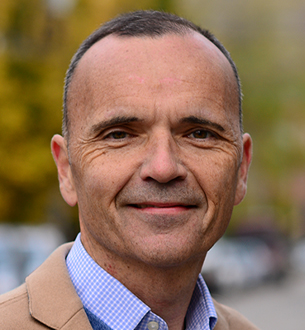

Opinion article by Daniele Zanotti and Mark Aston, originally published in the Toronto Star on October 17, 2022.
In the lead up to Election Day, we’ve seen a great deal of debate around “affordable” housing. One crucial piece has been missing from these conversations: the need for deeply affordable housing, and solutions for ending homelessness. Homelessness in Toronto is a crisis, and it’s getting worse.
More people experience homelessness than ever before, and the services meant to help people, including emergency shelter and housing, are at a breaking point. Homelessness is the result of a combination of poverty, a lack of affordable housing, and inequitable and inadequate access to the right supports. We can, and must, step up our collective action. We need housing and community supports that are adequate and dignified — and we need them now.
City data tells us that 9,724 people reported experiencing homelessness in the last three months, with over 50 per cent of those people having experienced chronic homelessness for at least six months. Every month those numbers increase; more people are entering the shelter system than are leaving it, stretching the capacity of shelters beyond their limits. As the Toronto Star reported recently on its front page, there is quite simply nowhere for people to go.
Indigenous and racialized communities are disproportionately impacted by the homelessness crisis. Indigenous people make up 15 per cent of those who experience homelessness, while representing just 0.5 per cent of the general population. Fully, 59 per cent of people experiencing homelessness identify as racialized, with 31 per cent as Black while being only 9 per cent of Toronto’s overall population.
These numbers point to an urgent need to develop social, cultural and economic strategies to respond to the unique needs of these communities.
Toronto has the resources and the capacity to end homelessness today, but they must be allocated appropriately. In 2020, city council endorsed the vision that homelessness be rare, brief and nonrecurring in Toronto, embedding it in the city’s housing charter. Though this was an important step, it’s time to move beyond commitments and charters and take concrete action.
Candidates vying to represent Torontonians on the new council must make ending homelessness a priority, committing to real, tangible actions they will support once elected, including:
- Make ending homelessness a top city priority in the coming term;
- A minimum monthly target for housing access to be provided to people experiencing homelessness;
- Establish a dedicated fund and increasing financial resources to ensure homelessness is rare, brief, and nonrecurring;
- Dedicate and increase specific funding to For Indigenous, By Indigenous housing strategies, along with service providers led by and focused on Black and racialized people;
- Develop a city Plan to End Homelessness
The hundreds of organizations represented and supported by the Toronto Alliance to End Homelessness and United Way Greater Toronto — which serve people experiencing homelessness, either through emergency shelter services or housing and supports — know what it takes to end homelessness. It is housing. It is providing the supports people need to find and keep their housing. It is a co-ordinated, data-driven system. It is effective prevention and diversion strategies, including for youth, to stem the flow into adult homelessness. And it is a responsive emergency shelter system that delivers housing-focused services for people seeking refuge at their doors.
We believe we can achieve a Toronto where homelessness is rare, and we stand ready to do our part as partners in community to make this a reality. We need our city council to share that belief and hit the ground running on Oct. 25 by prioritizing targeted action to make it so.
Mark Aston is the chair of the Toronto Alliance to End Homelessness. Daniele Zanotti is CEO of United Way Greater Toronto.